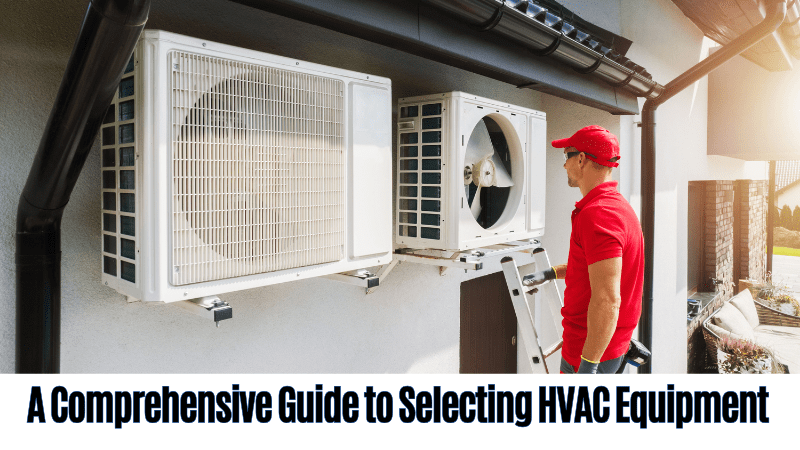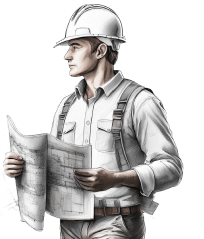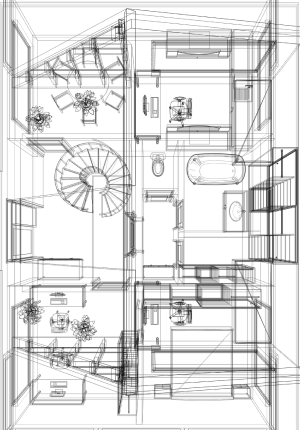A Comprehensive Guide to Selecting HVAC Equipment

Selecting the right HVAC equipment is similar to embarking on a journey through a maze of considerations. Your choices will impact comfort, efficiency, and long-term costs. In this guide, we’ll guide you through the complexities of heating, ventilation, and air conditioning systems, examining essential factors to help you make well-informed decisions for your home or business. Here are key factors to keep in mind:
- Heating and Cooling Needs
Understanding the heating and cooling needs of your space is the cornerstone of selecting appropriate HVAC equipment. Beyond mere square footage, consider ceiling height, insulation, and the local climate. Oversized or undersized systems can lead to inefficiencies and increased energy costs.A detailed assessment, which includes the use of tools such as Manual J, ensures that your chosen HVAC system aligns perfectly with the unique requirements of your environment, delivering optimal comfort throughout the year. Additionally, adapting the HVAC system to the local climate guarantees year-round comfort. Factoring in insulation further refines system requirements, with well-insulated spaces contributing to reduced energy consumption.
While self-assessment is valuable, seeking professional guidance, especially when utilizing tools like Manual J, is crucial for a comprehensive analysis. This ensures that the selected HVAC system is not only appropriately sized but also tailored for optimal efficiency and comfort.
- Energy Efficiency
Energy efficiency is the heartbeat of sustainable HVAC systems. This aspect goes beyond the immediate cost considerations, playing a significant role in long-term savings, environmental impact, and overall system performance.
As you explore options, pay close attention to the Seasonal Energy Efficiency Ratio (SEER) for air conditioners and the Annual Fuel Utilization Efficiency (AFUE) for furnaces. Investing in high-efficiency models with advanced features like variable-speed motors and smart thermostats not only reduces environmental impact but also translates into long-term cost savings, making your HVAC system an efficient and economical choice.
Incorporating technological advancements such as smart thermostats, including the ecobee New Smart Thermostat Enhanced – Programmable WiFi Thermostat that works with Siri, Alexa, Google Assistant, and is Energy Star Certified for smart home integration, enhances the performance of the system.
- Humidity Control
Humidity control is a vital aspect often overlooked. HVAC systems with integrated humidity control features contribute to indoor comfort and health. Optimal humidity levels prevent mold growth, enhance indoor air quality, helps in the preservation of indoor items (such as wooden furniture, artwork, and others) and mitigate potential health issues. When selecting HVAC equipment, prioritize systems that offer effective humidity control, ensuring a balanced and comfortable indoor environment.
The ideal indoor humidity level typically falls between 30% and 50%. HVAC systems with humidity control features can help maintain these levels, creating a comfortable and healthy environment. Smart HVAC systems may even allow you to set specific humidity preferences, tailoring the indoor climate to your preferences.
- Potential for Natural Ventilation
Explore the potential for natural ventilation to complement your HVAC system. Well-designed ventilation strategies harness outdoor air to improve indoor air quality and reduce reliance on mechanical heating and cooling. Incorporating natural ventilation not only enhances energy efficiency but also aligns with sustainable practices, creating a more eco-friendly and cost-effective approach to maintaining a comfortable indoor environment.
- Adherence to Codes and Standards
Adhering to local building codes and industry standards is non-negotiable. Compliance ensures the safety, efficiency, and reliability of your HVAC system. Violating these standards may lead to legal consequences, increased energy consumption, and compromised safety. Engage with HVAC professionals well-versed in local regulations to guarantee that your system is installed and operated in accordance with the required standards.
- Outdoor and Indoor Air Quality
Consider both outdoor and indoor air quality in your HVAC decision-making process. Outdoor air quality can impact system performance, especially in areas with high pollution levels. Prioritize HVAC systems with effective filtration mechanisms, regular maintenance schedules, and proper ventilation. Employ air purifiers and filters with high MERV ratings to capture pollutants, ensuring optimal indoor air quality and a healthier living or working environment.
Among the notable options is the AC Infinity AIRFRAME T7, a high-airflow fan system meticulously designed for cooling AV equipment rooms, closets, and larger enclosures. What sets it apart is its advanced filtration feature – a detachable nylon-mesh filter that acts as a formidable barrier against dust infiltration. This innovative filtration mechanism not only safeguards your equipment from potentially damaging particles but also contributes significantly to maintaining pristine indoor air quality.
- Cost
Cost considerations extend beyond the initial purchase price. Evaluate the overall lifetime cost, factoring in installation, maintenance, and operational expenses. While high-efficiency systems may require a higher upfront investment, the long-term energy savings often outweigh the initial cost. Striking a balance between upfront investment and long-term efficiency ensures a cost-effective solution that aligns with your budget and sustainability goals.
In the labyrinth of HVAC choices, a thoughtful approach to your unique needs and the outlined considerations will guide you towards selecting the ideal HVAC system. Consulting with HVAC professionals will provide further clarity, ensuring that your journey through the maze results in optimal comfort, efficiency, and long-term satisfaction.
If you have HVAC Design needs, email us at [email protected]. Our team of experienced professionals is ready to assist you in optimizing your HVAC system for maximum efficiency and comfort. Whether you’re planning a new construction project or considering upgrades to your existing system, we’ve got you covered.


